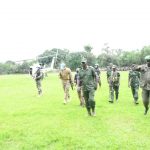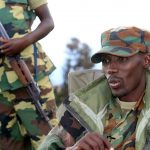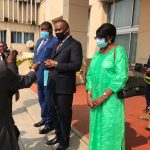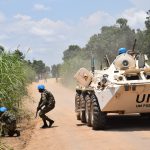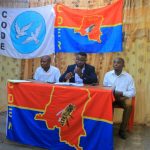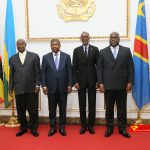The Political Group AFDC-A Alliance of Democratic Forces of Congo and Allies, member of the Parliamentary Majority and second political force of the DRC, 95% of members from civil society and which has 145 direct and indirect elected representatives on the ‘Congolese political spectrum, namely 41 national deputies, 70 provincial deputies, 13 senators, 2 provincial governors (South Kivu and Kasaï Central), 7 vice-governors (Ecuador, Maniema, Kasaï, Kasaï Central, Tanganyika, Tshopo, Tshuapa), 1 quaestor of the National Assembly and 11 presidents and vice-presidents of the Provincial Assemblies;
ADVOCACY FOR PEACE, SECURITY, STABILITY, GOOD POLITICAL, ECONOMIC AND SOCIAL GOVERNANCE IN THE DEMOCRATIC REPUBLIC OF CONGO
Is concerned about the legitimacy crisis resulting from the December 2018 elections, which affects the proper functioning of the institutions of the Republic and which worsens the political, economic, social, health and security situation which currently prevails in the Democratic Republic of the Congo.
The FCC-CACH coalition which has governed the country since the aforementioned elections has shown its limits, its inconsistencies and its inadequacies to such an extent that its internal quarrels have weighed down all the indicators which are in the red notwithstanding the will displayed and repeatedly expressed by the new President of the Republic Mr. Félix Antoine Tshisekedi Tshilombo;
On the political level: lack of consultation, lack of harmonisation and common policy, ungovernability, impunity, corruption, dysfunction of institutions and permanent conflicts between them, conflicts between members of institutions, conflicts and fights between members of political parties in coalition , violation of the rights of citizens and political parties, violation of the Constitution, laws and internal regulations of the chambers of parliament, political influence over the judiciary, management of the country on the basis of a secret agreement, typical behavior of an undeclared cohabitation etc … The new President of the Republic not having a majority in parliament, it is not easy for him to enforce his decisions.
On the economic level: Deterioration of the macroeconomic framework, absence of a development plan, non-existence of an economic recovery plan after the COVID 19 pandemic, absence of an economic support plan for companies in difficulty, lack of economic policy, insignificant and unrealistic budget, leakage of revenue, embezzlement of public funds, public contracts by mutual agreement, chronic deficits of public finances, loss of currency value and of the purchasing power of the population, virtual non-existence of reserves exchange rate, non * compliance with the finance law and the cash plan, drastic drop in exports aggravated by the COVID19 pandemic, deterioration of infrastructure, growing erosion in cities following the absence of an adapted urban plan, almost non-existence of food production and dependence on imports of food and other necessities, unfavorable balance of payments imbalance, abandonment of the industrial production etc … Yet the country is full of enormous agricultural, mining, energy, forestry, hydraulic and human potential.
On the social level: Inequality in the redistribution of national wealth, deterioration of the social and health conditions of the population, aggravation of the pauperization of the population, grumbling in all professional sectors, loss of purchasing power following the inflation, diseases aggravated by the COVID19 pandemic decline in household disposable income, poor housing conditions, repeated natural disasters, absence of mutual health insurance, high infant mortality rate, drop in the HDI human development index, declining lives, growing unemployment, displaced populations, etc …
On the security front: persistence of insecurity in the east of the country, Ituri, Béni, Rutshuru, Fizi, Uvira, Minembwe, infiltration of foreign troops in Bas Uele, South Ubangi, Haut Uele, Ituri, North Kivu, South Kivu , Tanganyika, Kwango, Kasaï Centrai. Growth of national armed groups, activism of foreign armed groups, under equipment, underpayment and poor support for the military and police. Absence of the state in some places. Desire for balkanization and self-determination etc … To this can be added the post-electoral frustrations due to the fact that several genuine elected representatives had been dismissed in complicity with the “Independent” National Electoral Commission – CENI – and the Constitutional Court. Other political forces were quite simply marginalized during the formation of the government, the case of AFDC-A, yet the 2nd political force established throughout the country and in several foreign countries for having presented the candidate Bahati Lukwebo for the post of president of the Senate competing with the FCC candidate.
This non-exhaustive picture deserves urgent preventive measures which require the resolution of the current crisis by peaceful and non-violent means, a political and social dialogue to seek the consensus of all the stakeholders. The country needs the reforms essential for its survival. That is why we advocate:
1) The gathering of all the forces in the presence of FCC – CACH – AFDC / A -LAMUKA, Civil Society and Congolese DIASPORA in a forum for a frank dialogue at the end of which a consensus should emerge on electoral issues (revise the Law election, reform and renew the CENI, update the electoral register), the revision of some articles not locked by the Constitution, in particular those allowing the return to the presidential election in two rounds, the acceptance of dual nationality, the election of provincial governors and senators by direct universal ballot, election of heads of judicial courts by their peers, etc. The difficulty lies in the parliamentary body which risks serving only the FCC instead of seeing the best interests of the country. Should we qualify the majority or should we agree on a two-year transitional period on the basis of a consensus around the President of the Republic?
2) Compose a government of missions, of reduced size with experienced personalities capable of straightening the slope for good governance, stabilization, economic growth, industrialisation, economic development and the attraction of investments based on the priorities and needs of the population. Secure private investments and stimulate national entrepreneurs.
3) Define priorities in the areas of education, health, civil service, military, police and the private sector.
4) Begin dialogue with all armed groups and design a realistic and coherent plan for the demobilization and integration of combatants. Speak with all the neighboring countries and the sub-region on diplomatic, security and economic issues. Promote dialogue between and within communities. Equitably distribute revenues between provinces and decentralized entities.
Take care of state agents, soldiers and police officers and ensure their regular pay.
Reduce if not avoid frustrations in the political class because sometimes a source of insecurity in the provinces.
To achieve this, the DRC needs the support and guidance of its friends, including the Congo, Belgium, France, Germany, Sweden, the European Union, the United States of America. , Russia, China, Canada, Great Britain, Angola, Kenya, Republic of South Africa, neighboring countries, MONUSCO, the African Union etc …
This is the contribution of our Political Group AFDC-A as to the way out of the current crisis in the Democratic Republic of Congo.
The National President and Moral Authority of AFDC-A
Senator Modest Professor BAHATI LUKWEBO




